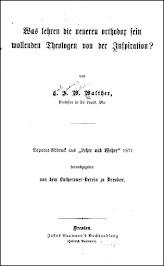[by C. F. W. Walther; Part 2]
We must admit that we have been challenged for some time by strong doubts as to whether Dr. Preuss was a converted Christian, which we have repeatedly expressed to colleagues. For far from the fact that Dr. Preuss accepted and defended with constant willingness everything, except for the most subtle points, that we have ever established as the truth, and far from the fact of his arguing with the piercing, heart-restraining and often frivolous way against those who err in faith, we say that this should have instilled in us confidence in the man. But on the contrary, besides other expressions of character, for some time it aroused in us the most embarrassing doubt, whether Dr. Preuss himself also believes from the heart what he confesses and so furiously defends, or if not his whole so-called faith is only a matter of his mind, leaving the heart empty, cold and unchanged. 1)
————————
1) As I said, this is not our judgment only after Preuss's apostasy. As often as Preuss had to read out his polemical (controversial) articles in the assembly of the editorial committees before their publication, it was usually the loveless, judgmental, frivolous, and occasionally vulgar failings that he had to delete. He did not learn his way of fighting from us, but rather he was always restrained by us in this. But if we also removed here and there the most offensive passages, we certainly could not completely take away the imprint of his spirit from his rebelliousness.
 |
| Author error: not Walther but Ed. Preuss |
With sadness this writer learned that the essay of Dr. Preuss in Lehre und Wehre [vol. 17, 1871, Nos. 2, 3, 4, 5]: “What do the newer orthodox theologians teach of inspiration?” had been published in Germany under his, this writer's [Walther’s], name in pamphlet form. [Internet Archive copy] For although we confess and still confess the judgment which is made in that essay on the false doctrine of modern German theologians, we cannot and will not confess its spirit, which expresses itself by the manner of treatment and judgments of persons in it. [Walther as editor] While Preuss had to delete, change and add many things in this article, yet it was not possible to give it a completely different character, and as Preuss stood at that time, immediately ready to improve everything according to our wishes, one hoped for the best for the future, until it finally became apparent that Preuss, in his blindness, thought that by his zeal with no understanding he would entice us to trust his seriousness to the truth. Unfortunately, he has shown a gift which the Jesuits now know how to use better than we who have been betrayed by him.
————————
<column 2>
In spite of our own impressions of the behavior of Dr. Preuss, however, he never gave us even the slightest hint until a certain hour that he had any doubt about any point of the Biblical doctrine of our Church and was inclined toward the doctrine of the Roman Church. Rather, up to a certain hour, he showed the greatest certainty of faith in view of our doctrine in proposition and opposition, especially in contrast to the papal church.
- - - - - - - - - - Continued in Part 3 - - - - - - - - - - -

No comments:
Post a Comment
Comments only accepted when directly related to the post.